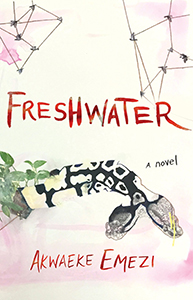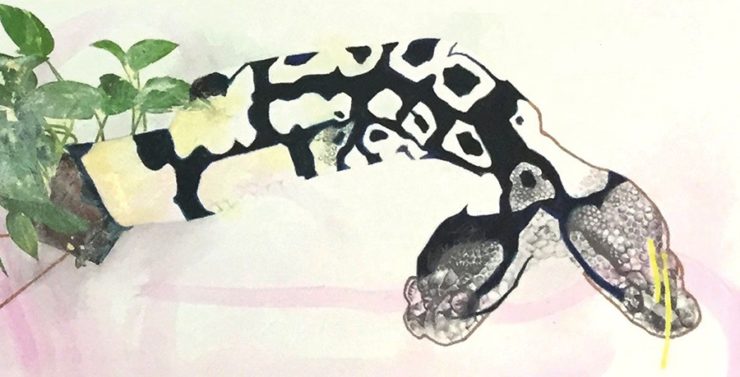Freshwater, Akwaeke Emezi’s harrowing yet beautiful novel, is the story of Ada, a young woman who believes herself to be inhabited by gods and versions of herself. She is ọgbanje, a concept from Igbo culture that means a child that is both coming and going, a kind of evil spirit that constantly dies and is reborn as a plague of bad luck to a family. But Ada doesn’t die in childhood, instead surviving through blood sacrifice and fracturing into multiple selves. As the years drag on, the psychic and physical stress of sharing a body with so many other beings each with their own contrasting demands, begins to take its toll. As Emezi peels back Ada’s layers, they expose the culture clash between Indigenous beliefs and Western colonialism.
Westerners who lack the context for ọgbanje are likely to offer an armchair diagnosis of Dissociative Identity Disorder, interpreting Asụghara and Saint Vincent as alternate personalities. And to be honest, that’s how I read Ada’s story at first, until the moment when We, what the ọgbanje call themselves, explain, “Earlier, when we said she went mad, we lied. She has always been sane. It’s just that she was contaminated with us, a godly parasite with many heads, roaring inside the marble room of her mind.” After that I decided to let the narrative take me where it wanted rather than insist upon a specific destination.
Buy the Book


Take, for example, cutting. From a viewpoint of Ada experiencing mental health crises, her acts are self-harm. She deliberately causes herself pain by cutting her arms and legs. This behavior is often used as a way of establishing control over the uncontrollable or internally managing pain inflicted by external sources. It’s a coping mechanism to dull intense emotional pain and stress (I say all that only as someone who has known several people who were/are cutters and the things they’ve relayed to me, not from personal experience). Given the terrible things Ada goes through, self-harm isn’t an unexpected reaction. Yet when viewed from Ada’s culture, cutting becomes an act of sacrifice to the gods inhabiting her body: “We had chosen the currency the Ada would pay us with back on the tar of Okigwe Road, in the maw of Añuli’s leg, and she paid it quickly. Once there was blood, we subsided, temporarily sated…we battered against the Ada’s marble mind until she fed us and that thick red offering sounded almost like our mother—slowly, slowly, nwere nwayọ, take it slowly.”
Is Ada really inhabited by gods or are we witnessing mental illness via an unreliable narrator? Could it be both experiences layered on top of each other like parallel universes? Deciding if Ada’s story is reality or imagination—or if Freshwater itself plays more toward fantasy or fiction—misses the point. The whole book is liminal space upon liminal space, a threshold between the past and the future, truth and lies. The narrative is as non-traditional as it is non-linear; Emezi and Ada are not beholden to Western rules and systems. Even the very narrative structure plays into this. Although the story is about Ada, she only rarely narrates. Most of the chapters are first person POV of the ọgbanje or one of her alters as they endure living in and through Ada. They shift her context and physical body as they grow, learn, and take control. The question of mental illness or gods detracts from the truth of her lived experiences.
Following the main plot like a shadow is a contemplation of spirituality. Although the god represented, Yshwa, is a major player in Judaism, Islam, and Christianity, Freshwater is more interested in exploring spirituality than religion, particularly the intersection of the philosophies underlying Christianity and Odinani. Ada’s relationship with Yshwa mirrors in many ways her relationships with the other occupants of the marble room in her mind. But Yshwa doesn’t lay dormant while the other alters take control. He comes and goes as he sees fit, bringing words of wisdom and a frustrating refusal to offer Ada a helping hand. He is a god, a blend of West Africa and the West. Yshwa is less opaque than We, but also less fickle than Asụghara and Saint Vincent.
Ada calls to Yshwa like a good Christian, prays and worships and honors his words. Yet he doesn’t respond like the Western interpretation of Jesus would, with a calling or vision or a plan. This Yshwa is immutable to prayer, for “he loves [humans] as a god does, which is to say, with a taste for suffering.” He changes faces as frequently as a snake sheds its skin and knows the agonizing pain of being human. Perhaps that’s part of Ada’s attraction to him? That he has already been through what she’s still trapped in the middle of. That he is strong enough to resist in ways neither she nor the occupants of her mental marble room are.
At 226 pages, I should’ve been able to breeze through Freshwater in an afternoon, two if I was feeling lazy. Instead, it took me nearly a week of consuming it in small portions. Racing through it felt disrespectful—To the gods? To Emezi? To literature itself?—for Freshwater is the kind of novel that deserves, no, demands immersion and focus. Every sentence left me reeling, every paragraph on the edge of my seat, and every chapter begging for more. I could’ve spent hundreds of pages more in Emezi’s lush creation.
Freshwater is an exploration of gender, spirituality, faith, family, love, trauma, and truth. It is simultaneously an oral history of a young woman’s declining mental state, mind-meltingly gorgeous poetry, a folkloric fable of gods and monsters, and a literary tale of love and loss and life. For a debut novelist, Akwaeke Emezi has successfully pulled off what many longtime writers only dream of doing. It’s an astonishing, haunting, stunning piece of work. I hate how good it is and I love that I had the opportunity to read it.
Freshwater is available from Grove Atlantic.
Alex Brown is a YA librarian by day, local historian by night, pop culture critic/reviewer by passion, and QWoC all the time. Keep up with her every move on Twitter, check out her endless barrage of cute rat pics on Instagram, or get lost in the rabbit warren of ships and fandoms on Tumblr.










